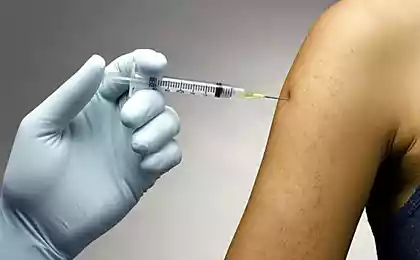569
Diseases, immunizations and natural prevention

It's not so simple as imagined, Pasteur and his successors. Some experts dispute the effectiveness of campaigns of mass vaccination... Accidents caused by vaccination for a long time underappreciated, even denied, well there are. But the Almighty medical power and current significant economic interests be forced to accept this controversial practice.
TETANUS
Acute, infectious disease is not contagious, caused by a Bacillus into the body in case of deep wounds. Characterized by intense contractures, can result in death due to respiratory failure in 1 case of 5 (children) and even 1 case 2 (in adults). In France per year sick about a hundred people.
The vaccine is based on a toxin produced by a microbe and weakened. Mandatory in France since 1940, for children up to 18 months. A repeat is recommended every 5 years (10 years for adults). It would give some protection if the replays were regular. On the contrary, according to the German expert, Dr Buchwald (Buchwald), the role of vaccination is minimal in the permanent reduction of cases of the disease, reducing, moreover, the observed long before the proliferation of vaccinations.
The vaccine can cause local reactions or, more rarely, neurologic complications. The risk increases with each new injection. Vaccination is not recommended after any recent vaccination in order to avoid complications.
The prevention of the disease. Systematic wound irrigation: to drain of blood, rinse with water with the addition of calendula and leave in the air (Bacillus afraid of oxygen). In severe cases, completely eliminate tetanus toxoid injections are much more dangerous than gamma globulins, which are just as effective. Recently developed at the Pasteur Institute test lets you know you are protected or not from this disease.
POLIO
A contagious disease caused by a virus that settles in the nerve centers and provokes serious paralysis. When ingested, the virus must overcome the barrier of the digestive (5% of cases) followed by the barrier the meninges (1%), before becoming a threat. Polio is still very scary and yet it affects only a dozen children a year in France (2 fatalities).
There are 2 types of vaccines: live virus that is received through the mouth and killed virus, injection. Both are used, but in a healthcare environment raging debates on this subject. Their effectiveness is disputed: the number of cases began to decline before the start of vaccination, and the epidemic broke out after the mass vaccination campaigns, moreover, they have not proved anything and in third world countries. Vaccination is compulsory in France since 1964, in spite of the adverse opinion of the Medical Academy.
Danger of inoculation: temperature, pain, and even paralysis, meningitis, encephalitis. Permanent cerebral damage. On the other hand, 1 case of 2 cases of polio in our days, provoked directly or indirectly (infection) vaccine! Maintaining its binding seems to be wrong, especially because the repetition required approximately every 5 years.
Living conditions and nutrition seem to play an important role to guarantee natural immunity: to take care of good personal hygiene, not drinking questionable water and not swimming in polluted water avoid contact with recently vaccinated persons, and especially to maintain good health a balanced diet (especially avoid: sugar, soda water, tropical fruits, potatoes and tomatoes).
DIPHTHERIA
A contagious disease caused by a Bacillus, provoking the formation of false membranes in the throat. There are simple forms, but sometimes also dangerous complications (respiratory, cardiac, etc.), which could result in death. Almost disappeared in developed countries (1-2 cases per year in France), where it applies only to "at risk" (alcoholics, immunoglobuline).
A vaccine made from a toxin produced by the Bacillus. It is mandatory in France since 1940, for children up to 18 months; repeat necessary every 10 years. Many believe that it is possible to put an end to the epidemics of the 40s, whereas others (for example, Dr. Buchwald) believe that, on the contrary, she was the reason! The vaccine is considered low-hazard, except in rare cases of Allergy, temperature, and well-known West's syndrome (type of epilepsy). May also provoke the disease in children already exposed to the invasions of germs.
Prevention is good nutrition and a healthy lifestyle, allowing not to be afraid of diphtheria: 90% of people have natural immunity against this disease. A simple test, "the reaction of Chic", makes it easy to identify this immunity. Mandatory vaccinations is outdated.
TUBERCULOSIS
Contagious disease, shall the Bacillus of Koch, lesions which are most often localized in the lungs. For a long time while remaining the scourge, tuberculosis clearly regresses in the course of 150 years, and its development often ends thanks to modern care, recovery. Approximately 11,000 cases per year in France, 10% of deaths. Primary infection corresponds to the first implantation of bacilli in the body, but does not constitute immunization.
The vaccine was developed by Calmette and Harinam (Calmette, Guerin) in 1922 from attenuated bacilli of cattle. It is mandatory in 1950 for children up to 6 years to 25 years of age. Efficiency, "low and temporary" according to Dr. ferro ("the collapse of the BCG" Dr. Marcel ferro, 1977, publishing house of National League for exemption from immunization), is disputed by many experts in lung disease. BCG vaccination since 1973, was abolished in Sweden and Germany.
Danger: one in a thousand cases — inflammation of the ganglion and a large fatigue. Also, rare: allergies, epilepsy, encephalitis, cancer and even leukemia, according to Dr. ferro. At the same time, the practice of BCG, "expanding" TB test worldwide, which prevents detection of new tuberculosis cases, especially atypical, with tuberculinica reaction.
Warning: life in hygienic and healthy conditions, with a balanced diet and physical activity outdoors. For unvaccinated tuberculosisi test is a useful means of control in case of doubt. In the Netherlands, without the use of BCG, the lowest level of tuberculosis.
WHOOPING cough
A contagious disease caused by a Bacillus and affects mainly children under 10 years. Is characterized by a special cough, lasts 4 to 6 weeks and, in General, non-hazardous, except for newborns. The vaccine developed from killed bacteria. In France vaccination is not required, but commonly practiced as is associated with other vaccines (diphtheria, tetanus, polio). Its effectiveness is controversial: the majority of recent epidemics (England, USA, Germany, Switzerland) was struck by a large percentage of vaccinated children — up to 60%.
The vaccine often causes the temperature and irritation 24 hours after injections and, in more severe cases, convulsions (1 case per 1000/ and cerebral damage (according to various estimates, from 1 in 200,000 to 1 in 15 000 cases). In 1976, Germany and Sweden refused this vaccine.
Warning: the child who is in good health, has less chance of Contracting pertussis and, more importantly, will be more sustainable if the disease is still going to happen. Take care especially for the youngest ate quite well and drank during an illness.
MEASLES
Contagious viral disease. Causes red rash, fever, and, rarely, respiratory or neurological complications.
The vaccine is made from live weakened virus. Can be effective, but the duration of the thus-obtained immunity is unknown, which requires endlessly to repeat the vaccination. Vaccination causes the same neurological complications as the disease: 1 case of 1000 — encephalitis. In addition, it delays the age of the possible occurrence of the disease, but it becomes much more dangerous for an adult.
The disease, in fact, necessary in the development of the child. Try to avoid it with a vaccine or any treatment is unreasonable.
RUBELLA
The viral disease is contagious, but not dangerous for the baby. On the contrary, a pregnant woman can cause abnormal development of the fetus.
The vaccine is made from live weakened virus. The quality and duration of protection are poorly understood. It risk: joint pain, arthritis, polyneuritis; delayed disease rubella increases the risk for pregnant women.
80 to 90% of women under 20 years of age have natural immunity against rubella, and without vaccinations. It is unlikely that systematic vaccination gives the best protection, just the opposite.
PIG
Infectious disease harmless in childhood but more dangerous for adults (complications that can cause infertility).
Vaccine with live weakened virus. Efficacy requires confirmation. The vaccine may cause fever and allergic reactions. But most importantly, it removes the disease until an older age, when the latter is much more dangerous.
Good health of the child allows to avoid complications of the disease.
published
Author: Mark Benard
Source: /users/1077























